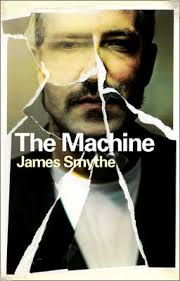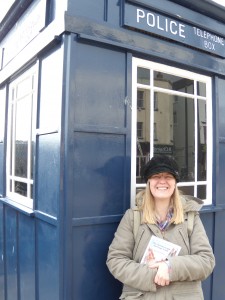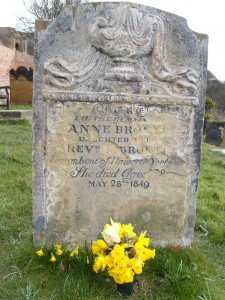A look inside James Smythe’s The Machine
 Maureen Kincaid Speller recently posted a fine review of Colson Whitehead’s Zone One, a ‘zombies take Manhattan’ novel that was submitted for the Clarke last year and one of those books widely thought to be a ‘near miss’ for the eventual shortlist.
Maureen Kincaid Speller recently posted a fine review of Colson Whitehead’s Zone One, a ‘zombies take Manhattan’ novel that was submitted for the Clarke last year and one of those books widely thought to be a ‘near miss’ for the eventual shortlist.
I enjoyed Maureen’s review very much, first (as always) for the elegant approachability of her style and scrupulous attention to detail, and secondly because it presented such a well argued view of a book that I personally found myself unable to get on with. I went into Zone One fully expecting to like it. The writing displays considerable flair and the assured craftsmanship of a novelist fully in command of his material is admirably apparent. The thing is, much though I wanted to, I could never get past the fact that it was a zombie novel, and for me the pairing of a familiar science fiction scenario (near-future catastrophe, city under siege, a band of survivors fighting to reassemble civilization) with what can only ever be a fantastical conceit was an uncomfortable mismatch. The living dead aren’t out there, they’re not coming to get you. There are many ways the world could end, but the zombie apocalypse has always been an unconvincing exhibit in the gallery of possibilities and much as I enjoy a good zombie movie I find the idea of zombies roughly about as scary as Stephenie Meyer’s wannabe vampires. Kincaid Speller herself puts it thus:
I have never found zombies especially interesting. Indeed, in terms of genre tropes, I’ve never been quite clear what they are actually for. Once you get past the idea of their being the ‘living dead’, with an unfortunate taste for live flesh, and especially ‘brainssss!’ there is not a lot to be done with them except to get rid of them.
Well, quite. Of course, as Kincaid Speller asserts and demonstrates in her review, Whitehead is going all out to try and give us more than just the traditional ‘gun and burn’ zombie novel, and in terms of his style and approach I can see why Kincaid Speller argues that he’s succeeded. But for me the question remains: is it in fact possible to write a ‘serious’ novel about zombies? Again, here’s Maureen:
We’ve been with Omega patrol for one novel, spread over three days and this sudden intimacy has brought us to care about these people, however artificial the circumstances. Yet, when the system fails, we run with Mark Spitz because what else can we do? It’s been three short days in the middle of something incomprehensible. We’re no closer to knowing why there are zombies, what the zombies want now that there are more of them.
And if Colson Whitehead, with all the considerable literary arsenal at his disposal, can’t make you believe in zombies, who can?
The truth is that if you want to inject new life into a dead trope the only way to do it is to approach it sideways. The one genuinely frightening thing about zombies is not the idea that the dead might rise (enough already), nor even the possibility that when they do they’re going to guzzle your brains. What’s frightening about zombies is that moment in which a zombie becomes a zombie – the moment when a known and loved human being changes into something alien, dangerous and utterly unknowable. These are the key moments in any halfway decent zombie narrative, and the ‘what ifs’ such moments give rise to form the only serious subtext of the whole zombie subgenre: what if our best friend/lover/mother was to be taken away and replaced by something monstrous? How would you even begin to confront that possibility?
Musing on Maureen’s review, I came to the conclusion that if more writers were willing to give up the zombie tropes, sacrifice a little of the over-familiar fantastical iconography for some more realistically applicable science fiction, they would quickly discover that this moment of change and the reasons surrounding it present far more serious and terrifying possibilities for fiction than the derivative aftermath. Just a day or two after revisiting Whitehead, I happened to begin reading James Smythe’s new novel The Machine, which with uncanny prescience seemed to present the perfect concrete illustration for my theoretical argument. Smythe’s novel is more understated than Whitehead’s, less determinedly showy in the manner of its telling. It isn’t even a zombie novel – though with its fascinatingly original variant on the trope it could be argued as such. And in its economical lines and claustrophobic spaces it achieves a realism that in the end and for all its high and earnest style Whitehead’s novel does not: it is so completely believable that it’s frightening.
The Machine is essentially a Frankenstein for the 21st century. Our Victor is not a scientist but a soldier. Suffering from post-traumatic stress after a near-fatal incident in Iran, he undergoes an experimental course of treatment that promises to excise the trauma but that in practice wipes his memory banks and leaves him in a near-vegetative state the medics call ‘vacancy’. In a fitting homage to Mary Shelley herself, the ‘modern Prometheus’ here is not Vic – he’s the reanimated corpse – but his wife Elizabeth. Fearing that she is at least partly to blame for Vic’s vacancy, Beth determines to steal her husband’s ‘body’ from the care facility where it’s being kept and bring him back to life by re-codifying his purged memories. The apparatus she will use to perform this miracle is the same now-illegal apparatus that caused Vic’s meltdown in the first place, known simply and ominously as the Machine.
Like the original Frankenstein, The Machine is far less a horror novel than a novel of serious science fiction that deals in the serious subjects of faith and science, hubris and responsibility. Should a technology necessarily be used, just because we have access to it? What happens when our imaginative reach outstrips our practical control? Beth’s inevitable descent into hell is described in terse, economical prose with a lethal clarity, and the message the novel shares with Shelley’s Frankenstein – that man is only ever one step away from becoming a monster of his or her own making – is delivered with devastating finality in a conclusion that gives the inimitable original a very good run for its money.
The Machine is set just decades from now, in a near future where the effects of global warming have begun to dramatically alter climate and weather patterns. Central London is at permanent risk of flooding, and whole stretches of Britain’s rapidly eroding coastline are now underwater. The Isle of Wight, where the main action of the novel takes place, is a parched, deprived hinterland of transient supply workers, disaffected youths and scruffy housing estates. Skiving teenagers hang about on corners, looking bored and being vaguely threatening. Neighbours gossip, kids daub graffiti. The sweltering weather aside, this might almost be the backdrop to Shane Meadows’s This is England, or Andrea Arnold’s Fish Tank. In other words, what happens to Beth could be happening right down the road from us. This is an environment so familiar, so parochially our own, and its alienating, arid spaces seem almost to mirror the obsessive, inescapably cyclical behaviours of their human inhabitants. Smythe’s confidently worked evocation of this particularly British landscape remains for me one of The Machine’s salient achievements.
I’ve read and enjoyed three of James Smythe’s novels this spring, and The Machine is the best yet. Immediately gripping and oppressively tense, it’s the most unputdownable book I’ve come across in a while. Smythe’s clean and supple English is a pleasure to read, and his facility with plot is something I can only gawp and point at admiringly. But perhaps the most exciting thing about Smythe is that here is a writer who clearly cherishes literary values who actively wants to write science fiction. Unlike the ‘mainstream dabblers’ he seems neither embarrassed by nor disdainful of being called a science fiction writer. He obviously loves the stuff and understands what he’s doing with it. You get the sense while reading him that he is himself excited – about the possibilities of SF in general and what he might be able to bring to it in particular.
With writers like James Smythe coming up, SF is far from exhausted, nor is it likely to become so any time soon.


